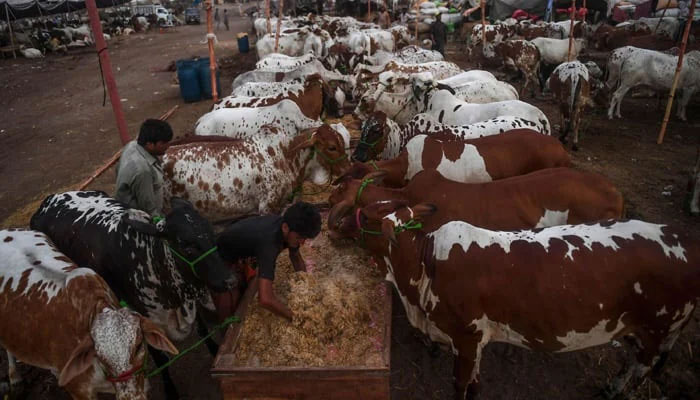Boosting livestock is the way forward
Pakistan is an agricultural state blessed with four seasons, fertile land, fresh water, high-quality cattle breeds, rich marine, and inland fisheries, and the manpower needed for high production in every subsector, including crops, livestock, fisheries, forestry, alternative power, and favourable weather conditions. Despite these advantages, production per acre, per unit, and per animal is too low to meet the dietary needs of the country. As a result, Pakistan spends a large amount of foreign exchange on importing food items, burdening its economy.
Several factors contribute to this low production. There is a lack of ownership in the agricultural sector and an absence of policies to create production zones.
In contrast, Australia focuses on land, water, planning, and technology to boost its agricultural output.
Australia has established agricultural production and extension zones, dairy production and extension zones, and meat production and extension zones.
Additionally, Australia has developed arid areas by creating wool development and extension zones for high-quality wool production, which is exported to other countries, earning substantial foreign exchange.
Farmers in these arid regions are prosperous and even own small planes to manage and look after their sheep farms.
In Pakistan, there is a lack of implementation of production policies, despite the availability of numerous policy documents prepared by foreign and local experts across all subsectors.
We lack research and development to increase per-unit production in all subsectors, even though we have highly qualified individuals in universities, research organisations, and extension sectors.
There is inadequate provision of facilities to enhance land fertility, insufficient tree and forest plantations, and minimal facilities to produce high-quality seeds.
Even basic seeds for major crops like wheat, rice, cotton, and edible oil are not available. Additionally, facilities for multi-cutting, saline, and drought-resistant fodder are missing.
Inadequate efforts to prevent the slaughter of elite dams and calves also contribute to low production.
Consequently, milk and meat production have decreased, and their prices have significantly increased.
There is little planning for culturing practices in the marine sector, despite its significant potential for fisheries and shrimp. Uncontrolled fishing practices threaten the potential of fisheries.
We do not have planning and facilities for developing semi-arid and arid regions for livestock development, saline and drought-resistant fodder, and tree plantations to increase the production of meat, wool, skin, and hides.
We lack incentives and facilities for providing solar and biomass energy in semi-arid, arid, and underdeveloped regions, and there are no policy initiatives for providing soft-term credits without collateral to small farmers in all subsectors through commercial banks.
There is hardly any policy for awarding the best farmers and technical officials in the sectors at the national level.
We lack planning to regulate the utilities of all subsectors equally according to agricultural rates. There are no incentives or subsidies for caring for elite dams, rearing, or fattening calves.
There are no efforts to change the livestock selling system in markets from a per-animal basis to a weight basis, forcing farmers to fatten their male animals to increase their weight before sale.
The shortage of water for land cultivation and other purposes, inefficient plant protection and disease research services, and expensive disease control measures also contribute to low production.
The government should constitute committees comprising experienced individuals for proper planning in critical areas across all subsectors of agriculture.
This is one of the essential ways to improve the country’s economy. —Dr. Muhammad Awab Tariq
-
 Garrett Morris Raves About His '2 Broke Girls' Co-star Jennifer Coolidge
Garrett Morris Raves About His '2 Broke Girls' Co-star Jennifer Coolidge -
 Winter Olympics 2026: When & Where To Watch The Iconic Ice Dance ?
Winter Olympics 2026: When & Where To Watch The Iconic Ice Dance ? -
 Melissa Joan Hart Reflects On Social Challenges As A Child Actor
Melissa Joan Hart Reflects On Social Challenges As A Child Actor -
 'Gossip Girl' Star Reveals Why She'll Never Return To Acting
'Gossip Girl' Star Reveals Why She'll Never Return To Acting -
 Chicago Child, 8, Dead After 'months Of Abuse, Starvation', Two Arrested
Chicago Child, 8, Dead After 'months Of Abuse, Starvation', Two Arrested -
 Travis Kelce's True Feelings About Taylor Swift's Pal Ryan Reynolds Revealed
Travis Kelce's True Feelings About Taylor Swift's Pal Ryan Reynolds Revealed -
 Michael Keaton Recalls Working With Catherine O'Hara In 'Beetlejuice'
Michael Keaton Recalls Working With Catherine O'Hara In 'Beetlejuice' -
 King Charles, Princess Anne, Prince Edward Still Shield Andrew From Police
King Charles, Princess Anne, Prince Edward Still Shield Andrew From Police -
 Anthropic Targets OpenAI Ads With New Claude Homepage Messaging
Anthropic Targets OpenAI Ads With New Claude Homepage Messaging -
 US Set To Block Chinese Software From Smart And Connected Cars
US Set To Block Chinese Software From Smart And Connected Cars -
 Carmen Electra Says THIS Taught Her Romance
Carmen Electra Says THIS Taught Her Romance -
 Leonardo DiCaprio's Co-star Reflects On His Viral Moment At Golden Globes
Leonardo DiCaprio's Co-star Reflects On His Viral Moment At Golden Globes -
 SpaceX Pivots From Mars Plans To Prioritize 2027 Moon Landing
SpaceX Pivots From Mars Plans To Prioritize 2027 Moon Landing -
 King Charles Still Cares About Meghan Markle
King Charles Still Cares About Meghan Markle -
 J. Cole Brings Back Old-school CD Sales For 'The Fall-Off' Release
J. Cole Brings Back Old-school CD Sales For 'The Fall-Off' Release -
 GTA 6 Built By Hand, Street By Street, Rockstar Confirms Ahead Of Launch
GTA 6 Built By Hand, Street By Street, Rockstar Confirms Ahead Of Launch




